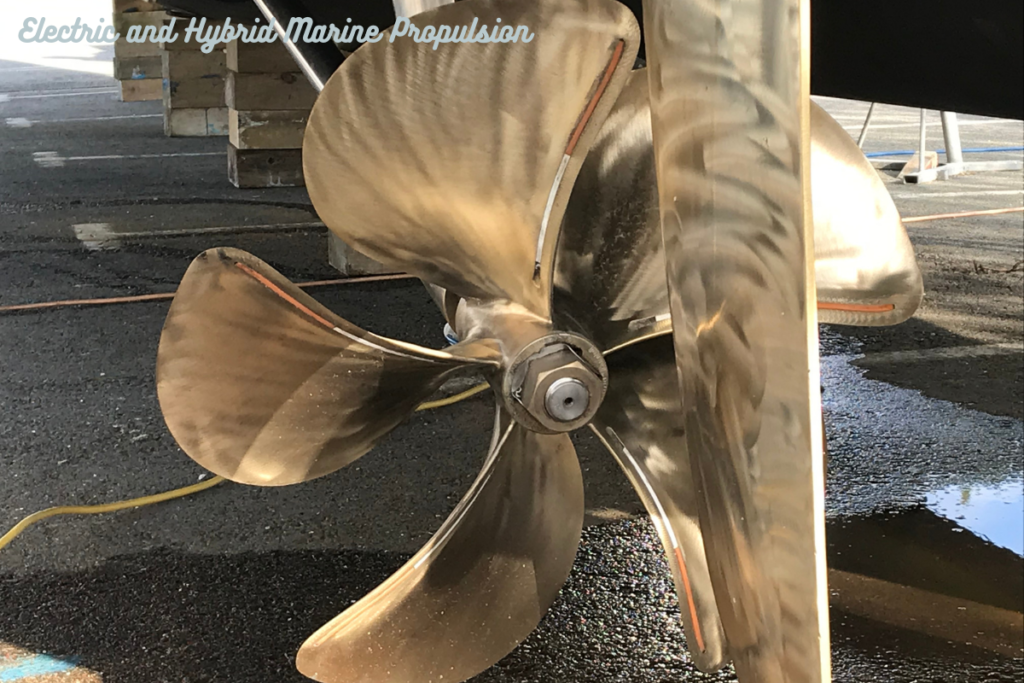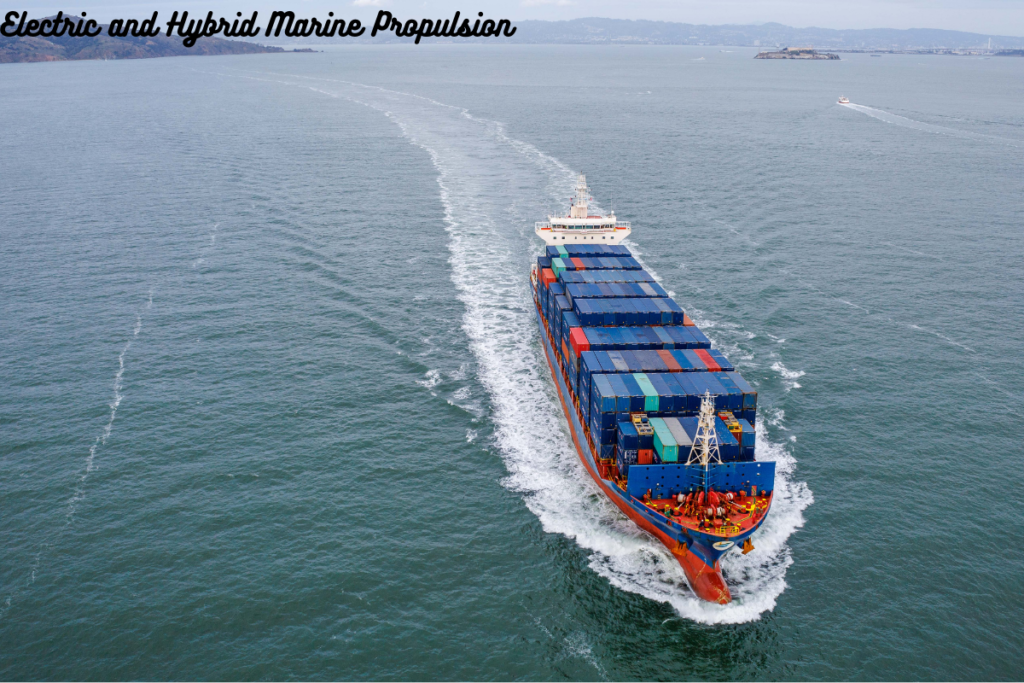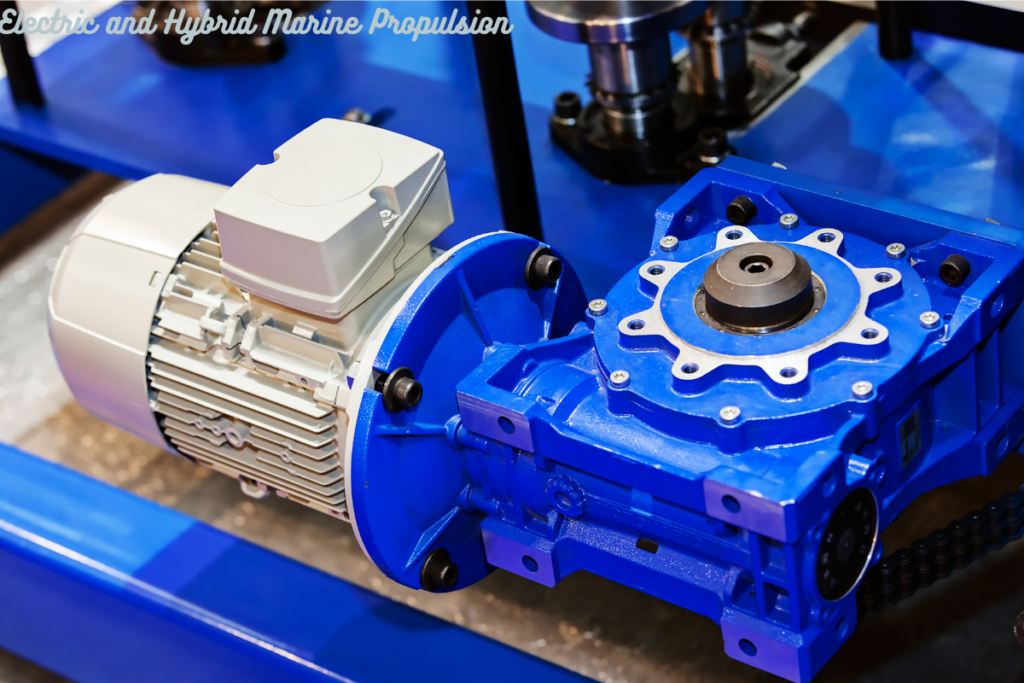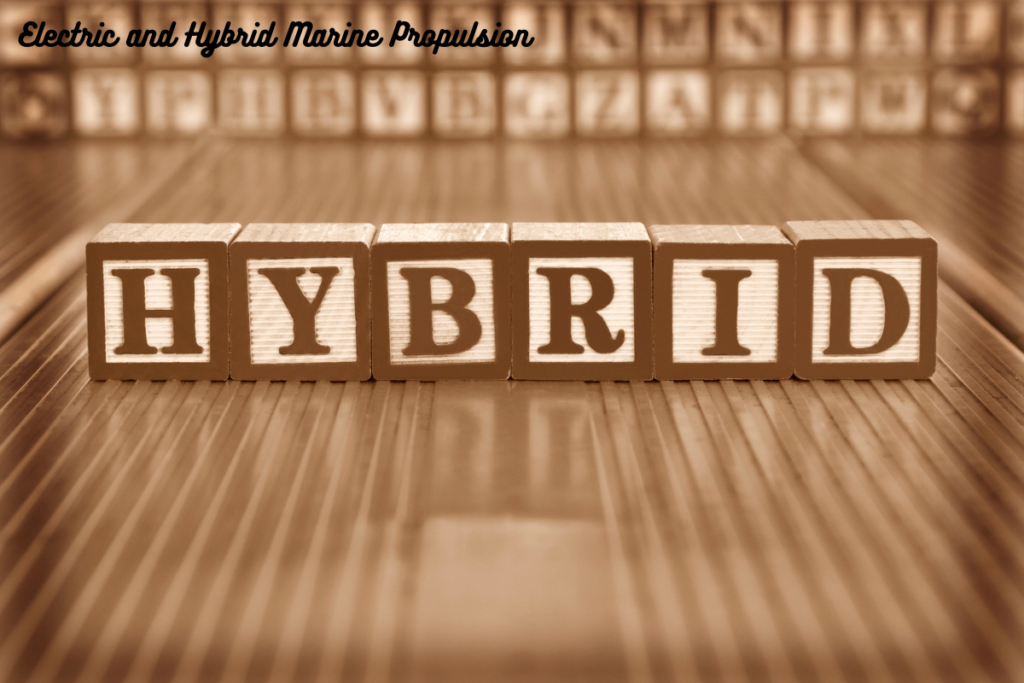Introduction:

The marine sector is transforming because of “Electric and Hybrid Marine Propulsion” systems, which offer more efficient and environmentally friendly options than conventional diesel engines. These technologies dramatically lower the emission of dangerous pollutants and greenhouse gases by powering marine vessels with electric motors and a variety of energy sources. Stricter environmental laws and a growing emphasis on lowering the carbon footprint of maritime activities are the driving forces behind this move towards greener propulsion technologies. Batteries and renewable energy sources, including solar and wind, are frequently used in electric propulsion. At the same time, hybrid systems can smoothly transition between electric drives and conventional engines to maximize performance and fuel efficiency.
Beyond its positive effects on the environment, using “Electric and Hybrid Marine Propulsion” technologies has many other benefits. For example, these techniques usually lead to quieter operations, which is important to minimize disruption to marine life and for passenger comfort. Additionally, they offer operational flexibility, allowing ships to perform well in various circumstances and speeds. Because these systems have fewer mechanical parts and wear and tear than traditional engines, their maintenance costs are typically reduced. The future of maritime transportation is expected to use “Electric and Hybrid Marine Propulsion” systems more and more, as battery technology develops and infrastructure for energy delivery and charging grows.
Table of Contents
Environmental Benefits:

The maritime sector is a major producer of greenhouse gas emissions worldwide, and classic diesel engines are one of the main polluters. But implementing “Electric and Hybrid Marine Propulsion” presents a viable way to lessen shipping’s negative environmental effects. These technologies considerably reduce emissions of carbon dioxide, nitrogen oxides, and sulfur oxides—all of which have a negative impact on air quality and contribute to climate change—by utilizing electric motors and batteries, or a combination of electric and diesel engines.
In comparison to conventional diesel engines, “Electric and Hybrid Marine Propulsion” systems have a higher energy efficiency, which means they need less fuel to produce the same amount of power. “As a result of this drop in fuel use, pollutants and greenhouse gas emissions will also go down. Additionally, the energy needs of electric and hybrid marine propulsion systems, including Transfluid Hybrid Marine Propulsion, can be further supplemented by the use of renewable energy sources, such as solar or wind power, which further reduces emissions and dependency on fossil fuels.”
“Electric and Hybrid Marine Propulsion” is being implemented in accordance with international environmental norms and standards that are intended to minimize emissions from maritime sources. Ship operators can help create a cleaner and healthier marine environment by utilizing these technologies. The lower emissions from “Electric and Hybrid Marine Propulsion” systems contribute to better air quality, lessening the effects of pollution on marine ecosystems, and mitigating climate change.
Moreover, the development of “Electric and Hybrid Marine Propulsion” technology is opening the door for more effective and silent boats. Marine life and coastal towns enjoy a more tranquil environment as a result of these systems’ decreased noise pollution. Electric and hybrid marine propulsion will become more practical for a larger range of vessels as technology advances and costs fall down, causing a big transition in the maritime industry towards one that is more ecologically conscious and sustainable.
Efficiency and Fuel Savings:

Fuel consumption is a significant factor in the operating costs that the maritime industry must constantly minimize. Systems for “Electric and Hybrid Marine Propulsion” are a strong way to maximize fuel economy and save significant amounts of money. By utilizing these technologies, ships can use electric power instead of fuel-intensive diesel engines for propulsion when traveling at slow speeds or through environmentally sensitive locations.
“Systems for ‘Electric and Hybrid Marine Propulsion’ make better use of energy possible, especially at low speeds where typical diesel engines perform less efficiently. During these times, being able to transition to electric propulsion cuts fuel use and lowers operating expenses. Powering the seas: Advances in Marine Technology. Regenerative braking systems, which collect energy during deceleration, are another way to improve fuel economy and cut down on energy waste.
Systems for “Electric and Hybrid Marine Propulsion” offer adaptability and flexibility in a range of operating environments. With the use of these technologies, vessels can tailor their power sources to meet certain requirements, for example, utilizing diesel engines for fast cruising or electrifying power for silent operation in ports. Customized energy management is made possible by this flexibility, which maximizes fuel efficiency and reduces fuel consumption.
“Electric and Hybrid Marine Propulsion” solutions have substantial long-term cost savings. As a result of lower operating costs due to decreased fuel usage, vessels are now more financially viable. Over the course of the vessel’s life, additional cost savings are derived from the longer lifespan and lower maintenance requirements of electric components when compared to traditional diesel engines. Ship owners may improve their bottom line and help create a more sustainable and profitable marine sector by utilizing these technologies.
Operational Flexibility:

Because ships must negotiate a variety of operating requirements and operate in a variety of environments, the maritime sector places a high value on flexibility and adaptability. By enabling smooth transitions between electric and conventional power modes, “Electric and Hybrid Marine Propulsion” systems offer a considerable advantage and enable optimal efficiency in every situation. Vessels can adjust to shifting circumstances thanks to this dynamic propulsion strategy, which maximizes performance while reducing environmental effect.
Without using loud, dirty diesel engines, “Electric and Hybrid Marine Propulsion” solutions enable ships to function in port situations and environmentally sensitive places. Vessels can traverse these regions more silently and effectively by converting to electric power, which lowers pollutants and helps to maintain a healthier marine environment. The smooth transition between conventional and electric power modes enables effective power management, adapting to specific requirements and reducing fuel usage.
Moreover, “Electric and Hybrid Marine Propulsion” systems offer improved maneuverability, especially in tight places or difficult circumstances. Electric motors may be precisely controlled to enable smoother and more responsive movement, which facilitates narrow channel navigating, docking in confined locations, and rapid response to changing conditions. This increased agility minimizes the impact of operations on the environment and increases safety and efficiency by lowering the likelihood of accidents.
Through the adoption of “Electric and Hybrid Marine Propulsion” solutions, the maritime sector can attain increased operating efficiency and flexibility. The smooth transition between conventional and electric power modes enables efficient power management, which lowers fuel consumption and has a minimal negative impact on the environment. This versatility helps to create a more sustainable and effective marine business by giving vessels the tools they need to traverse a range of circumstances and meet a variety of operating requirements.
Reduction in Noise Pollution:

Because it has an adverse effect on both human activity and marine life, noise pollution is a major environmental concern in the marine environment. Conventional diesel engines generate a great deal of noise, which disrupts marine environments and makes traveler and coastal community experiences unpleasant. “Electric and Hybrid Marine Propulsion” presents a viable way to reduce noise pollution and make the sea environment more peaceful and calm.
When compared to conventional diesel engines, the use of electric motors in “Electric and Hybrid Marine Propulsion” systems considerably lowers noise levels. “The silent operation of these engines results in less noise and vibrations, which makes the surrounding area more tranquil for both passengers and marine life. In sensitive regions, like marine sanctuaries or coastal villages, where noise can disturb both human activity and marine life, this reduction in noise pollution is especially helpful. Engineering Excellence: The Future of Marine Engines.“
By lowering noise pollution, “Electric and Hybrid Marine Propulsion” helps to make the maritime sector more ecologically friendly and sustainable. Because these systems operate more quietly, marine life is better able to communicate and navigate, protecting marine ecosystems from the damaging impacts of noise. The passengers’ experience is enhanced as well, making the atmosphere on board ships more pleasurable and tranquil when there is less noise.
Using “Electric and Hybrid Marine Propulsion” systems is a big step in the right direction for a more sustainable and peaceful maritime environment. These innovations promote a more peaceful coexistence of people and the water by lowering noise pollution, which benefits both human populations and marine species. We may anticipate a considerable decrease in noise pollution as the technology develops and is more extensively used, resulting in a more tranquil and sustainable marine environment for everybody.
Lower Maintenance Costs:
Maintenance and repairs are expensive for the maritime sector, especially for traditional diesel engines that need frequent component replacement and regular servicing. Systems for “Electric and Hybrid Marine Propulsion” present a strong argument for lowering these maintenance expenses, improving long-term financial savings and efficiency.
Compared to conventional diesel engines, “Electric and Hybrid Marine Propulsion” systems with electric motors and batteries have less mechanical parts and moving parts. Due to the streamlined design, there are fewer parts that require inspection, servicing, or replacement, which lowers the amount of maintenance needed. Lower maintenance costs are a result of the mechanical complexity being reduced, which also reduces the possibility of malfunctions and expensive repairs.
Predictive maintenance and early problem detection are made possible by the “Electric and Hybrid Marine Propulsion” systems’ sophisticated electronic controls and monitoring systems. By offering real-time data on the propulsion system’s health and performance, these technologies lower the risk of unplanned breakdowns and enable preventive maintenance. “Electric and Hybrid Marine Propulsion” systems save downtime and related repair costs by addressing possible issues before they become significant ones.
For ship owners, the long-term financial benefits of fewer maintenance requirements are substantial. Systems for “Electric and Hybrid Marine Propulsion” provide a more economical and effective means of propulsion, reducing repair costs and downtime. The maritime sector may enhance financial performance, maximize operational efficiency, and contribute to a more sustainable and economically viable future by adopting these technologies.
Regulatory Compliance:
International rules aiming at minimizing environmental effect and decreasing emissions are putting increasing pressure on the maritime industry. “Electric and Hybrid Marine Propulsion” systems provide an answer to these changing needs, guaranteeing adherence to present and future environmental regulations and averting possible penalties and limitations.
The global trend towards cleaner and more sustainable maritime operations is in line with the introduction of “Electric and Hybrid Marine Propulsion” technologies. These innovations greatly enhance air quality and the health of the marine environment by reducing emissions of greenhouse gases, particle matter, and other pollutants. Shipping businesses show their commitment to environmental responsibility and help the worldwide effort to battle climate change by adopting “Electric and Hybrid Marine Propulsion”.
Ship owners can comply with the increasingly strict emission regulations being enforced by various regulatory authorities globally by utilizing “Electric and Hybrid Marine Propulsion” systems. These systems are made to abide by the laws as they stand and are positioned to do so when the requirements increase in the future. Businesses can ensure long-term sustainability and regulatory compliance by using “Electric and Hybrid Marine Propulsion” systems and avoiding potential fines and penalties connected with non-compliance.
Adopting “Electric and Hybrid Marine Propulsion” systems is a commitment to a future where sustainability is of utmost importance, rather than merely complying with existing rules. Shipping businesses show their dedication to environmental responsibility and are ready for a time when cleaner, more sustainable operations will be the standard by investing in these technologies. “Electric and Hybrid Marine Propulsion” technologies guarantee the maritime industry’s sustainability and prosperity by offering a route to long-term regulatory compliance.
Adoption of Renewable Energy:
The maritime sector is looking for methods to become less dependent on fossil fuels and more dependent on renewable energy sources in order to improve energy independence and sustainability. The integration of renewable energy is made easier by “Electric and Hybrid Marine Propulsion” systems, which open the door to a more sustainable and environmentally friendly future for shipping.
Renewable energy sources like solar and wind power are naturally compatible with “Electric and Hybrid Marine Propulsion” systems. Batteries enable a vessel to store energy so that it can be used for propulsion when needed, and to harvest renewable energy generation when conditions are right. By minimizing greenhouse gas emissions and reducing dependency on fossil fuels, the integration of renewable energy sources promotes a cleaner and more sustainable maritime sector.
Solar panels and wind turbines can be installed on boats using “Electric and Hybrid Marine Propulsion” systems, producing renewable energy onboard. By augmenting the energy requirements of the propulsion system, these renewable energy sources can lower fuel consumption and improve energy independence. Utilizing the sun’s and wind’s energy, ships can run more sustainably and help create a more environmentally friendly future.
The use of “Electric and Hybrid Marine Propulsion” technologies creates new opportunities for environmentally friendly maritime transportation. Vessels may lessen their influence on the environment, use less fossil fuel, and support a cleaner, more sustainable marine sector by incorporating renewable energy sources. The transition to renewable energy is essential to preserving shipping in the long run, reducing global warming, and promoting sustainability.
Conclusion:
Adoption of “Electric and Hybrid Marine Propulsion” marks a turning point toward a more efficient and sustainable maritime sector. Ship owners that use these technologies can lower their environmental effect while simultaneously increasing operational effectiveness, cutting expenses, and getting ready for new regulations. A comprehensive answer to the problems of the twenty-first century is provided by electric and hybrid marine propulsion, opening the door to a more sustainable, quieter, and cleaner shipping industry in the future.
We anticipate an acceleration of the adoption of “Electric and Hybrid Marine Propulsion” as the technology advances and becomes more affordable. The shift to these cutting-edge technologies will be fueled by the growing awareness of the environmental effect of the maritime industry as well as the growing desire for cleaner and more sustainable transportation options. The development of the marine sector has advanced significantly with the introduction of “Electric and Hybrid Marine Propulsion,” paving the way for a period when efficiency and sustainability will be crucial.
People also ask:
Ships with a hybrid electric propulsion system use both standard engines and electric motors to move faster, more efficiently, and with less pollution.
Diesel engines, gas turbines, electric motors, hybrid systems, steam turbines, and wind-assisted propulsion are some of the marine propulsion systems. Each one works well and efficiently in its own way.
Pingback: Powering the Seas: Advances in Marine Engine Technology
Pingback: Propelling Forward: Latest Trends in Marine Engine Design
you are in reality a good webmaster The website loading velocity is amazing It sort of feels that youre doing any distinctive trick Also The contents are masterwork you have done a fantastic job in this topic
Thank you for your comment and your interest in the blog. Your encouragement means a lot to me!
Your article helped me a lot, is there any more related content? Thanks!
Your article helped me a lot, is there any more related content? Thanks! https://accounts.binance.com/register?ref=P9L9FQKY